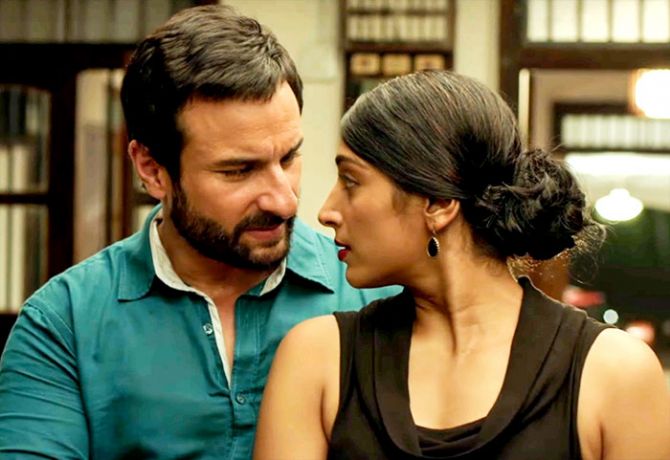Former ad man Raja Krishna Menon comfortably sips his black coffee on a Sunday afternoon.
He's quite relaxed as he discusses his latest film Chef, starring Saif Ali Khan, which is an official adaption of Jon Favreau's Hollywood film of the same name.
Menon confesses to being quite the foodie himself!
"I love to eat," he says. "I also travel a lot. A few years ago, I shut down everything, took my kid out of school and backpacked for seven months."
He travelled all over Latin America, starting with Brazil and going to Argentina, Chile, Bolivia, Peru and Mexico.
His travels were inspired by food. "The culture of a place is reflective of the food they eat," he feels.
Menon, who has directed Airlift before he moved to Chef, shares his movie experiences.

How did you think of remaking Chef in Hindi?
I never actually thought of remaking anything.
I don't like the word remake; adapting is fine.
When I saw the (Hollywood) film -- it was a late-night show with a couple of friends -- I loved it.
I came out happy and smiling.
My friends and I came home and said, 'Forget cinema, forget jobs, we'll launch a food truck and go to Europe.' (Laughs.)
But I never thought of it (adapting the film).
Vikram Malhotra, who produced both Airlift and Chef, came up to me when I was shooting Airlift in Jodhpur and asked what I thought of Chef.
I said I love it. He asked me if I wanted to remake it. I said no, because it is a good film. It's a Jon Favreau film, why would I shoot myself in the foot?
He said he had the rights and asked me to think about it.
I spent some time with Suresh (Nair) and Ritesh (Shah), who wrote the film with me, and we found some important points.
The character Roshan Kalra (played by Saif Ali Khan) is about 40 years old. He decided to become a chef in the late 1980s-early 1990s. It was an important time for India because it was the first time that liberalisation was happening and people were beginning to think about other jobs.
Roshan Kalra making that choice to become a chef in that time, I thought, was a very India specific point.
His ex-wife, Radha Menon, is a dancer; she is divorced but she is a happy person. Her happiness doesn't depend on her husband or marriage.
She has her own happiness, friends, does her own things, has her own job, she doesn't give a damn.
She is still friends with her ex-husband.
I feel these things are modern, we see it around us, but we don't see it reflected in cinema.
Once we found the basic elements, we said this film has to be made.
Not too many food films are made in Hindi.
Food is such an important aspect of our culture. I use the word 'culture' very loosely.
It's so important to family. A lot of our memories are around a dining table or around a feast. It's not so much about the food as it is about feeding people.
Saif mentioned that you had asked him not to be too fat or thin.
There's an old adage, 'You don't trust a thin chef.'
So I told him not to work out and get these big muscles because a chef's life is miserable. It's not fun. It's hard because you have to work all the time and it's thankless.
Unless he is a celebrity chef on TV, I don't think any chef has the time to go and lift weights.
Saif also said that films are a director's medium. Do you agree?
One hundred per cent!
I think you have to take the blame as well as the positives that come with it.
But that doesn't mean ki kisi aur ka kaam nahi hai (no one else has worked on it).
It's a director's medium because the control is in your hands.
But the actor is the face and is extraordinarily important because you can have whatever vision you want, if you can't control the actor or if the actor is unable to understand it, it won't work.

Was it difficult to jump from one emotion to the other in this film?
This is easily the most difficult film I've made.
The only reason I could make this film is because I had the time behind me.
It's a very subtle film in its emotions.
All the actors were absolutely brilliant.
Was it easy to work with Saif?
Very easy, actually.
We connected at an intellectual level.
He has grown up with privilege, very differently from my character.
I can give you as much literature as you want, but if you don't have a meal for one day -- not because you were working late but because you couldn't afford it -- it's an emotion which is very hard to understand.
There is a scene in the film where he says, 'Main Amritsar main sota tha toh chuhe chalte the mere upar (When I was in Amritsar, rats would run on top of me).'
He said what nonsense, don't make up anything.
It took him a long time to understand that there is a possibility that a mouse can run over your leg.
He said nobody lives like that but we worked together on it.
Of all the actors I have worked with, he is the most easy, from a direction point of view, because he really wants to do what the director wants to do. He is willing to listen but he has to understand it.
Fortunately, he is going through second fatherhood, so a lot of the questions that we ask in the film are important to him.
Some of the questions he asks in the film are, 'Am I a friend? Am I a confidant? Am I a disciplinarian? Who am I to my son?'
I think he really is asking those questions.
How did you transform Saif into a chef?
A lot of work had to be done.
We went to the JW Marriott and met Himanshu, the head chef there. We started with the basics, like how to hold a knife. We also did a lot of cutting and cooking.
We spent a lot of time in the kitchen while they were in service, trying to understand their body language. It's manic, like a production on steroids.
We also spoke other chefs like Alex and Rohan. They helped us out.
Chef Sandhya was on our set through the film as a consultant.
We also listened to chefs talking about their lives.

What was working with Svar Kamble like?
He is a very grounded kid, very relaxed.
He just runs around the place and gives his shot.
The make-up guys were troubled as he would go out in the sun.
But he is unaffected by the things around him. He comes from a middle class background.
Poor guy, I would make him shoot at 2 am; he would be half asleep but he would get up and give his lines.
How did he come on board?
We had auditioned about 200 kids. I thought I was running a school.
It was hard to say no.
But I didn't meet all the kids.
We brought it down to 50 kids, then divided them in groups of five.
I did acting workshops with them, playing different games, coming up with ideas, telling stories.
From there, we came down to five.
Svar stood out.
While writing a character, doesn't a part of you go into the character?
Yes. I have a son; I grew up as a single child. Not that it mattered, but I am sure there's something from that which kind of resonated.
My son's relationship with me allowed me to ask a lot of questions which I wouldn't have been able to ask otherwise. If I didn't have a kid, how would I ask the questions that a father of a kid would?
I grew up in a lower middle class kind of a situation, no money.
Fortunately, I've managed to get some success.
I am very fortunate to be making films.
Which is the most challenging part about making a film?
The most difficult part begins after you make the film... the process of getting it out there. I am always fighting with marketers and producers that you don't want to show too much or too less.
As a director, I'd rather stay behind the camera. I am not excited about standing on some stage with some people. It's not my thing, so that's difficult.

But Chef hasn't been promoted much.
Hasn't it? My God, I couldn't do any more than this (smiles).
I believe in honest communication. Audiences are tossing out films that fake their trailers.
I understand a producer's point of view to show this and that. Which is why, item songs and all those things... people don't need it. If you have an item song, I think you will lose an audience. I am convinced about it.
When I saw Hindi Medium, I loved the film. I saw the trailer and I wanted to watch the film.
Then I saw one song and said, 'Maybe not'.
I think the honesty is coming into the process of marketing a film.
What next after Chef?
I have written two scripts.
I have done very little work in my life. I made a lot of ads but only four films.
I have been around for 20 years, so I have a hard disk full of scripts, most of them are bad and desperate (laughs)! No one is giving me a film, so let me write a script (laughs again).

Talking about your advertising background, do celebrities help in selling products?
It's the easier option.
You have to work really hard -- if you don't have a celebrity -- to make a good ad.
I remember a commercial that R Balki wrote for Surf, where they said, 'Daag acchey hain (Stains are good).'
You need a lot of work to get to that point.
It's a wonderful thought.
But when you don't have this, then just get a Salman Khan and make him say, 'Surf is very good.'
Someone would watch it and say if Salman is saying it, I'll buy it.
But there are some nice integrations. There was a Ranveer Singh Chings ad. It was fun. He did a cool Durex one; he does cool stuff.
India makes the best ads. Go around the world and watch their ads; they are terrible.
Balki and Prasoon Joshi, for instance, changed advertising.










